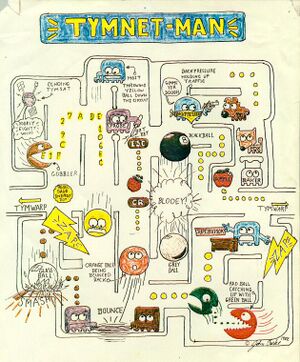Tymshare Base-Host Protocol
From Computer History Wiki
Revision as of 05:40, 28 April 2022 by Larsbrinkhoff (talk | contribs) (It's called message, not packet. Add message type column.)
This documents the protocol, as used around 1975, between a PDP-10 host and Varian 620 Tymbase.
Messages start with a 4-octet header. More data may optionally follow after the header, depending on the message type.
| Message number | Port | Subtype | Data |
Messages. Any number not in this list is illegal.
| Number | Type | Name | Comment |
| 1 | A | ANS | System is answering. |
| 2 | A | SHT | System is up but shut. |
| 3 | A | CRS | Sender is crashed. |
| 4 | A | DIE | Recipient should crash. |
| 5 | A | NSP | Base taken over by new supervisor. |
| 6 | B | LOG | Login, next 4 data characters are the info about terminal type, and port or origin, then name, etc. |
| 7 | B | AUX | Supervisor response to establishing auxiliary circuit. |
| 10 | B | NOP | Back pressure on. |
| 11 | B | OUP | Back pressure off. |
| 12 | B | GOB | Character gobbler. |
| 13 | B | ZAP | Circuit zapper. |
| 14 | B | EDC | Enter deferred echo mode. |
| 15 | B | LDC | Leave deferred echo mode. |
| 16 | B | GRN | Green ball. |
| 17 | B | RED | Red ball. |
| 20 | B | YEL | Yellow ball. |
| 21 | B | ORG | Orange ball. |
| 22 | B | HNG | Hang character - not used. |
| 23 | B | ETM | Enter 2741 transparent mode. |
| 24 | B | LTM | Leave 2741 transparent mode. |
| 25 | C | LOS | Lost ball, data has been lost from buffers. The data filed may tell how many were lost. |
| 26 | C | SUP | Supervisor request (aux circuits). |
| 27 | C | SUR | Supervisor response (aux circuits). |
| 30 | C | AXC | Supervisor string character. |
| 31 | F | TSP | Test pattern probe. |
| 32 | F | TSR | Test pattern response. |
| 33 | F | SAD | Host sad. |
| 34 | B | ECN | Echo on. |
| 35 | B | ECF | Echo off. |
| 36 | D | TCS | Term characteristics, first data byte indicates which characteristics second data byte indicates value to set to. |
| 37 | C | TCP | Term characteristics probe, data byte indicates which terminal characteristic were requested. |
| 40 | D | TCR | Term characteristics response, data is just like TCS, comes in response to a probe; also is reflected by remote when terminal characteristics are sent. |
| 41 | C | HSI | Host up and answering with # of ports in port byte, and host # in data byte. |
This information comes from the SUMEX-AIM monitor file TYMSRV.MAC, written by Michael A. Heathman in 1975.
